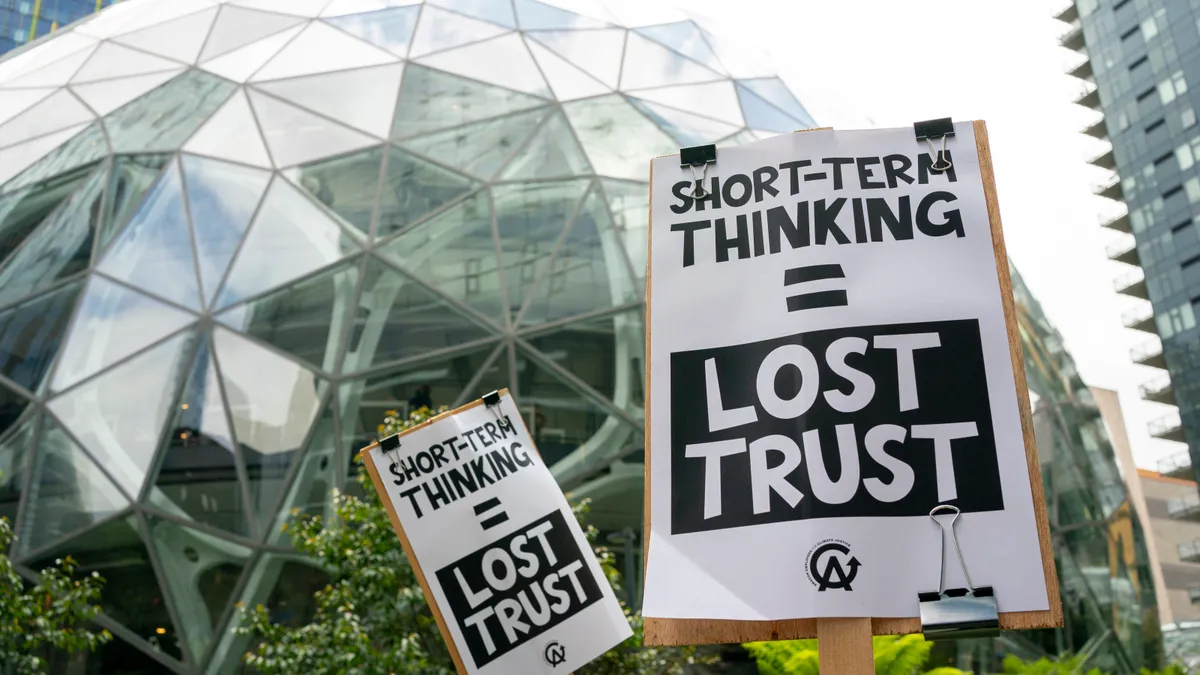With employees making an unprecedented exodus from their jobs — the quit rate soared to a record 3% in November — HR managers are pulling out all the stops to retain workers. Employers have offered beefed-up benefit packages, better compensation and more time off, among other perks.
Stay interviews are getting a closer look as well. The practice involves a member of the HR team sitting down with employees one on one to get a better sense of what they value about the company and their roles, and, in some situations, what might be pushing them toward the door. While stay interviews may be back in vogue due to the Great Resignation, the tool should remain a permanent part of employers' toolboxes, Kate Grimaldi, senior director of enterprise talent strategy at Paylocity, told HR Dive.
How to approach the stay interview
There are two different ways to conduct a stay interview, Grimaldi said. The first is "very rigid." "You could sit down with an employee and say, 'This is going to be our stay interview. I'm going to ask you questions about why you stay here. I'm going to walk you through some different scenarios. I'm going to ask you for some feedback,'" she described. This scenario typically feels more formal and is usually scheduled in advance.
Grimaldi recommends a second approach, which looks more conversational. "Very rarely will I sit down with an employee and say, 'Alright, today's [our] stay interview,'" Grimaldi said. "What I will say is, 'Hey, we have our normal conversation today. Let's cover any of the quick topics that we want to get to and then I'm going to ask you some questions that may feel a little bit different. But really, I just want to get some feedback and get a better sense of how you're feeling lately, and your attachment to our company.'"
Whatever approach HR decides to take, Grimaldi recommends a similar set of open-ended questions: Why do you still work here? Why haven't you looked outside of the company? How's your bandwidth? What's your workload? Do you feel like you make a difference? Do you feel like the company values your contribution?
While HR will always want to learn about certain aspects of the employee's experience, keeping the talk more improvisational than interview-oriented will help the employee to open up and feel heard while creating less of an intimidating atmosphere, she explained.
Look out for red flags
The stay interview can be a great opportunity for HR to become aware of problems within the company, from poor acknowledgment of an employee's contributions to tension within their department. The HR pro should keep an ear out for signs of dissatisfaction and gently follow up on them.
"One of my favorite questions is, 'Do you feel like if you left tomorrow, there'd be a hole in the company?' I ask that question because I think it provides a really great perspective — depending on the employee's answer — about how they think they are valued," Grimaldi said. "And if I, as a manager, believe there'd be a huge hole if someone left and that person's response is, 'No, I think you guys would just post the job and forget about me,' I immediately know that there's a disconnect there and that person's unhappy."
Being clear about how HR will address a given situation is imperative to an employee feeling heard. If an employee discloses mistreatment from a manager, for example, Grimaldi said the conversation should shift to a focus on that topic, including deeper-probing questions: Can you tell me more about your relationship with your manager? Why do you feel they don't value you and can you provide an example?
"And then I'm going to tell them, 'Hey, look, we don't value that kind of behavior here,'" Grimaldi said. "'We don't tolerate that.' And I usually ask the employee, 'Are you comfortable with me addressing that with that leader or with that leader's leader?' And then I provide an actual follow up."
Ensure valuable feedback
Depending on an employee's past experiences with HR, concerns about relationships at work or concerns about job security, they may be understandably hesitant to open up about frustrations. If HR has been siloed or a team member is new to the role, Grimaldi recommended developing rapport with colleagues before jumping into stay interviews. "Nobody's going to share anything when there's no trust there," she said. Transparency about how the information will be used and shared is also crucial.
While it may be tempting to only approach those with a long tenure at the organization or who have a certain kind of role, stay interviews are "just as important for someone who's been at a company for six months as it is for someone who's been there for six years," Grimaldi said. A new, inexperienced staffer could provide insight on company culture that is just as valuable as a more senior leader's.
Grimaldi said she recommends HR pros maintain a flexible approach with stay interviews, but aim to conduct such conversations around 2 to 3 times per year. "I don't think they should be overly planned," she noted. "You shouldn't really have it on your calendar where your employee knows, like, every quarter you're gonna have an interview with them. Because then it becomes a check-the-box [exercise] and it's no longer making the person feel like you genuinely care."
One time to prioritize the stay interview is when "you're concerned, maybe you've heard through the grapevine that somebody's not happy," Grimaldi said. "Maybe they've continually gotten feedback about their performance that you think might cause them to look elsewhere." In such a case, a stay interview could be an intervention that pulls an employee halfway out the door back in — assuming the reasons behind the desire to leave can be addressed.
A permanent part of the toolbox
Stay interviews shouldn't just be used to stanch the bleeding during a particularly difficult time in the labor market or at the company. Like a competitive benefits package and a strong DEI program, "a stay interview is something that should be a part of your business strategy and a part of your talent strategy," Grimaldi said.
Why? "Retention is always a challenge, regardless of the labor market, regardless of reshuffles and resignations," Grimaldi said. Done right, stay interviews provide "true, actionable feedback and a true understanding of what a person values in their workplace."
Even beyond feedback that can uncover red flags and point toward valuable parts of the compensation and benefits package, stay interviews can foster the kind of culture that employees find supportive. "At the end of the day, that's what employees want," Grimaldi said. "They want to know that they've been heard."




















